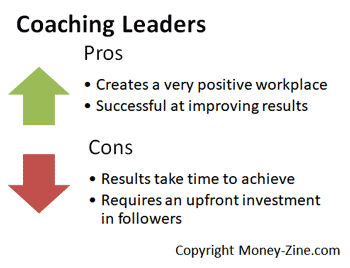If a company's intellectual capital is weak, or if they're looking for someone willing to share their knowledge, then it's critical to find someone practicing the coaching leadership style. Coaching leaders are excellent at helping others to advance their skills, building bench strength, and providing career guidance.
Attributes of Coaching Leaders
As described my Daniel Goleman, the coaching leadership style is best summed up by the phrase "try this." They're able to tie together career aspirations and personal goals. They help followers to see how everything fits together. And because of this ability and interest in helping others, they're good at developing a long-term plan to reach long-term goals.
| Additional Resources |
| Affiliative Leaders Autocratic LeadershipAuthoritative Leaders Charismatic Leaders |
These leaders provide plenty of feedback on performance; but they are also experts at delegating and giving employees assignments that are challenging too. They won't hold someone's hand through the rough times, but they will tell them how to weather the storm. To summarize the attributes of coaching leaders, these are individuals with a genuine interest in helping others succeed. They do this by focusing on the development of others, while using their keen sense of empathy and their own self awareness.
Pros and Cons
One of the interesting findings of Goleman's research was the coaching leadership style was the least used in the workplace. That's because many managers do not believe they have the time needed to help others. This mindset is unfortunate because the investment made in employees oftentimes provides abundant returns.

The coaching style is very successful at improving results. Superior climate and performance are achieved for two reasons that go beyond the investment in training others:
Coaching leaders provide a very positive workplace environment.
Employees know exactly what's expected of them, and they understand the overall strategy of the company.
Perhaps the biggest drawback of this style is that it takes time and patience. A manager needs to make an up-front investment in an employee with the hope of reaping the rewards of above average performance later on.
Effectively Using the Coaching Style
This style is most effective when the employees working under the coach are receptive to this help. If someone is managing employees that are extremely resistant to change, or are not interested in learning new things, the manager will struggle if they choose this style. It's also inappropriate to use this style if someone lacks the technical expertise needed to help those they're managing. It's very rare in the workplace to find employees that are not interested in improving their performance and bettering themselves. As a coach, it's important to supply ongoing feedback on performance. It's equally important to do this in a manner that motivates the employee and does not create fear. The intriguing aspect of the coaching leadership style is that it is used so infrequently, yet it is extremely effective in almost any situation; they're constantly sending their followers this message:
I believe in your abilities.
I'm willing to invest my time in you.
In exchange for this trust and investment, I expect you to try your hardest.
Examples of Coaching Leaders
It is extremely difficult to find clear examples of modern-day coaching leaders. The best examples of this particular style would be those labeled as "famous" mentors, or those involved in well known mentoring pairings. The following list of mentoring pairings provides examples of the coaching leadership style at work:
Red Holtzman (NBA coach) mentored Phil Jackson (NBA coach)
Andrew Carnegie (philanthropist) mentored Charles Schwab (first president of U.S. Steel)
Eddy Merckx (five-time Tour de France winner) mentored Lance Armstrong (seven-time Tour de France winner)
Robert Patterson (CEO, National Cash Register) mentored Thomas Watson (founder of IBM)
About the Author - Coaching Leadership


